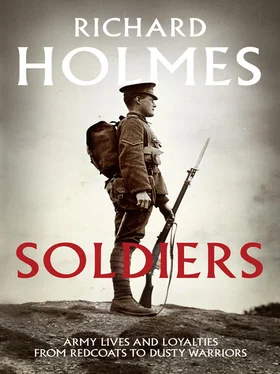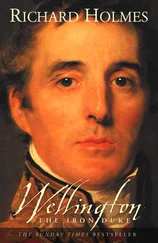Eden was succeeded by Harold Macmillan, who had served him as both foreign secretary and Chancellor of the Exchequer. A publisher’s son, Macmillan was at Oxford in 1914 and was commissioned into the Grenadier Guards. He was first wounded at Loos in 1915 and had been wounded again by the time he was hit in the pelvis as the Guards Division attacked Guillemont on 15 September 1916. This was the same battle that killed Lieutenant Raymond Asquith and Lieutenant Colonel Guy Baring. Macmillan lay in No Man’s Land reading Aeschylus in Greek, and then spent the rest of the war undergoing a series of operations. Like Eden, he was marked by his experiences. He could not bear to return to Oxford to finish his degree, for he could never forget that of his first-year group at Balliol, only one other had survived the war.
In 1924 he was elected, as Captain Macmillan, for the industrial constituency of Stockton. He lost his seat in 1929, but returned to the Commons in 1931. Like Eden he was scornful of appeasement and appeasers, and his easy but authoritative style made him a natural choice for high office when Churchill came to power. From 1942 to 1945 he was resident minister in the Mediterranean. He took over from Eden in 1957 and served till 1963, assuring the country that ‘You’ve never had it so good.’ Macmillan’s concern for social reform, which put him towards the left of the Conservative party of his day, reflected his contact with ordinary folk in the trenches. ‘They have big hearts, these soldiers,’ he wrote, ‘and it is a very pathetic task to have to read all their letters home. Some of the older men, with wives and families who write every day, have in their style a wonderful simplicity which is almost great literature.’
The pattern was broken by Macmillan’s successor, Sir Alec Douglas-Home, who had contracted spinal tuberculosis in 1938. He was bedridden for the first two years of the war and unfit for service thereafter. Harold Wilson, Labour Prime Minister 1964–70 and 1964–6, had volunteered for service in 1939 but had, very sensibly in view of his first-class economic brain, been directed into the Ministry of Fuel and Power. Edward Heath, Conservative Prime Minister 1970–74, had been commissioned into the Royal Artillery, rose to the rank of lieutenant colonel, and soldiered on part-time with the Honourable Artillery Company after the war.
Martial prime ministers are the tip of the iceberg. Until the 1960s the front benches were packed with men who had fought in the world wars, and, certainly as far as the Conservatives were concerned, having had the proverbial ‘good war’ was almost a sine qua non of political success. But a man’s service record did not determine his political stance. Denis Healey had been at Balliol College, Oxford with Edward Heath (the men remained friends) and was commissioned into the Royal Engineers, serving as military landing officer at Anzio in 1943. He gave a ‘barnstorming and strongly left-wing’ speech, still in uniform, at the 1945 Labour Party Conference. But although he made a massive dent in the traditional Conservative majority at Pudsey and Ottley that year, he was not elected till 1952.
In 1962 it was estimated that 9 per cent of MPs were former regular officers, and that military representation in the Commons was nearly a hundred times greater than in society more broadly. 13Conscription endured till 1962 and, until the sharp cuts of 1967, the Territorial Army was over 100,000 strong: both factors helped maintain military experience in parliament. Margaret Thatcher selected all her secretaries of state for defence from former officers. Michael Heseltine, who held the post in 1983–6 was the least martial. Son of a Second World War lieutenant colonel, Heseltine was called up in 1959 in the dying days of National Service and commissioned into the Welsh Guards. From 1945, serving officers were suspended from duty when they ran for parliament, and were required to retire if elected. Heseltine contested the safe Labour seat of Gower in 1959, and was not required to resume service after his defeat. It was not until the appointment of Malcolm Rifkind in 1992 that this chain was broken. No subsequent secretaries of state for defence have had military service, although John Reid, first-rate minister for the armed forces 1997–9 and secretary of state for defence 2005–6 owed part of his affinity with the military to his family ties, for his father had served in the ranks of the Scots Guards.
The passing from politics of the Second World War generation was underscored by the last of the ‘good war’ Tories. Lord Carrington had been commissioned into the Grenadiers in January 1939, and fought from Normandy into Germany with the Guards Armoured Division where he earned a Military Cross commanding the first tank across the great bridge at Nijmegen. Foreign secretary in 1982, he resigned, with characteristic probity, to acknowledge his department’s failure to predict the Argentine invasion of the Falklands. William Whitelaw, ex-Scots Guards and awarded a Military Cross in Normandy, 1944, held a variety of government appointments. He exercised huge influence over Margaret Thatcher, who made him the first hereditary peer created for eighteen years after her victory in the 1983 election. His resignation in 1987, on grounds of ill-health, deprived her of a major steadying influence.
The Parliament whose life ended with the general election of 2010 contained 43 MPs with military service of some sort. Eighteen were ex-regular army officers, ranging from Michael Mates, sometime lieutenant colonel in the Queen’s Dragoon Guards, to Andrew Mitchell, who had held a ‘gap year commission’ between school and university. There were thirteen Territorials, one of them an ex-regular army officer and another a former member of the RAF; seven former members of the RAF; one of the Royal Navy; one who transferred from the Royal Navy to the Royal Naval Reserve; and another naval reservist. One, Rudi Vis, Labour MP for Finchley and Golders Green, had served in the Dutch Armed Forces in his youth. This constituted 6.6 per cent of a house of 646 members. The breadth of the definitions above, which includes both an MP who served in his university’s Officer Training Corps forty years ago, and another medically discharged after a brief period of regular training, underlines the thinness of real military experience, though at least two of the Territorials have been mobilised for service in Iraq or Afghanistan.
To enable peers and MPs without military service to speak with more knowledge of the armed forces, Sir Neil Thorne, a Conservative MP and Territorial colonel, founded the Armed Forces Parliamentary Scheme (AFPS) in 1987. ‘The whole purpose of the scheme,’ he writes, ‘is to enable Members of all parties to speak in debates on the Armed Forces from a position of experience’. 14The scheme lasts a year, during which participants are expected to spend at least 21 of 30 offered days with the armed forces, selecting the service of their choice. They are initially given status roughly aligning them with majors or their equivalents to enable them to spend time with soldiers, sailors, and airmen, rather than to receive the two-star status normally accorded to MPs visiting military units. 15
The AFPS makes it possible for participants to return, ‘at four levels from Major to Brigadier equivalent’. At least one, Dr Julian Lewis, Conservative MP for New Forest East, spent some time at the Royal College of Defence Studies, writing a 10,000-word dissertation that was rated in the top ten for his year. In all about ninety MPs have participated in the scheme. The opinion of serving army officers on its usefulness is divided, with some contributors to the invaluable Army Rumour Service website arguing that anything that brings MPs into closer connection with the services can only do good. The facts that the scheme has flourished despite its lack of official funding, and attracts both peers and MPs who take it very seriously, underline the perceived need to remedy the progressive demilitarisation of parliament.
Читать дальше












